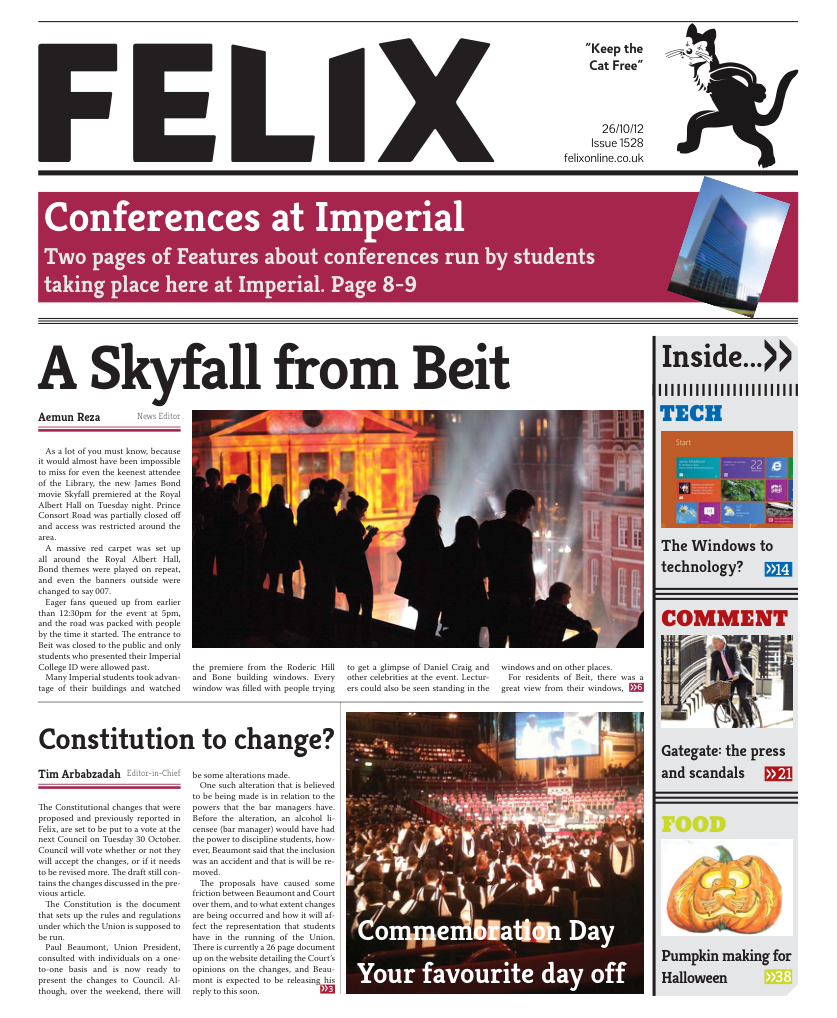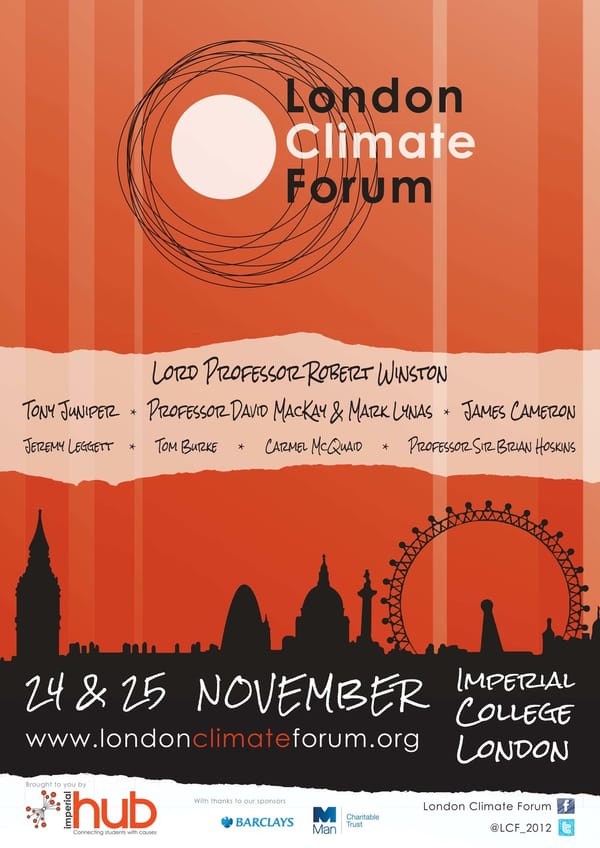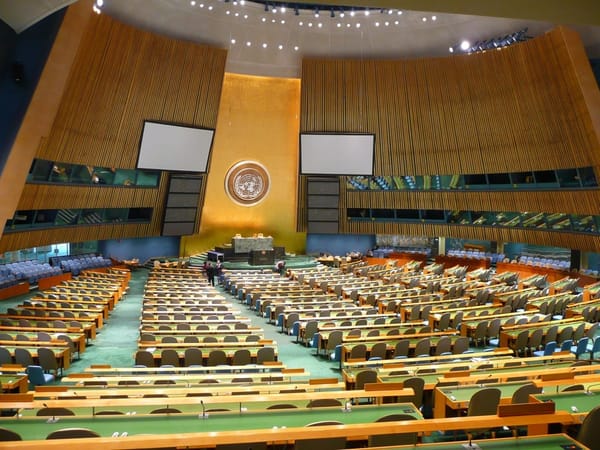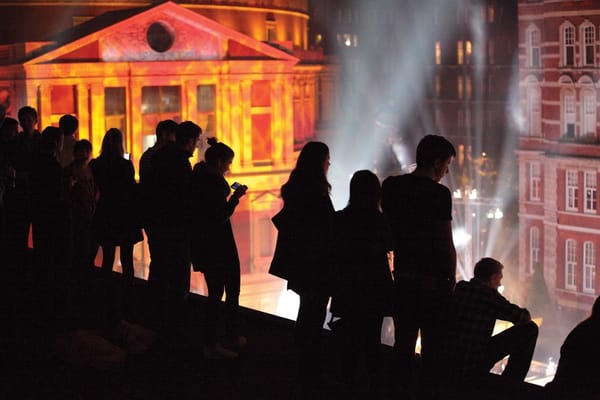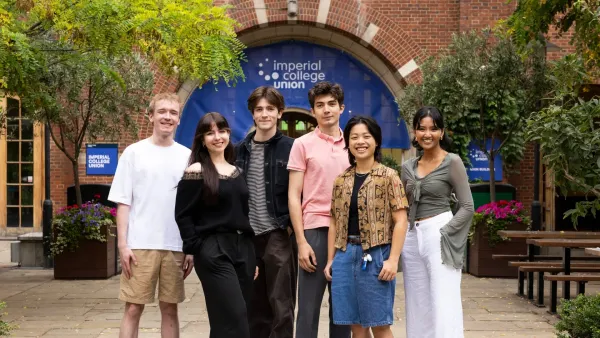Constitution changes to be decided at Council
Court and President argue, but on Tuesday 30 October Council will decide if the proposals will become the Constitution
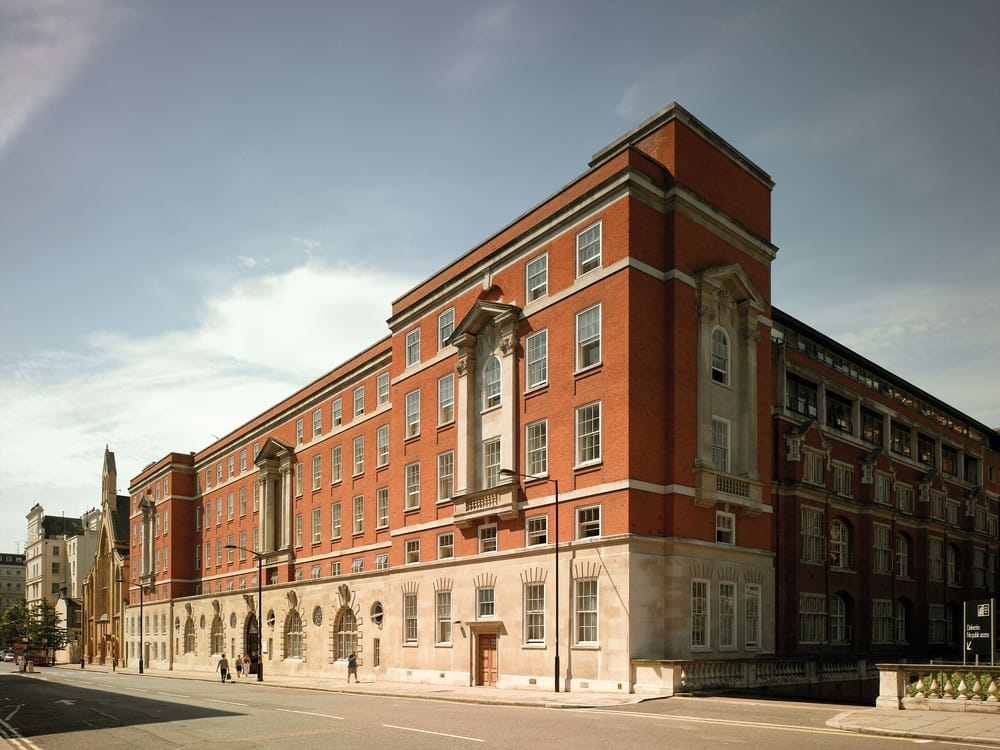
The Constitutional changes that were proposed and previously reported in Felix, are set to be put to a vote at the next Council on Tuesday 30 October. Council will vote whether or not they will accept the changes, or if it needs to be revised more. The draft still contains the changes discussed in the previous article.
The Constitution is the document that sets up the rules and regulations under which the Union is supposed to be run.
Paul Beaumont, Union President, consulted with individuals on a one-to-one basis and is now ready to present the changes to Council. Although, over the weekend, there will be some alterations made.
One such alteration that is believed to be being made is in relation to the powers that the bar managers have. Before the alteration, an alcohol licensee (bar manager) would have had the power to discipline students, however, Beaumont said that the inclusion was an accident and that is will be removed.
The proposals have caused some friction between Beaumont and Court over them, and to what extent changes are being occurred and how it will affect the representation that students have in the running of the Union. There is currently a 26 page document up on the website detailing the Court’s opinions on the changes, and Beaumont is expected to be releasing his reply to this soon.
Beaumont summed up the draft Constitution by saying that “apart from the changes that have been discussed, the rest of it comes down to how it’s written, rather than how it works in practice”. The budget for the Union, which, due to fact that it is dealing with money and how and where it is being allocated is very important, was previously set up by the Executive Committee (Exec.). The draft Constitution refers to “the Union” proposing the budget to the Trustee Board, who then must approve it. However, it does not explicitly state there who that refers to. It is thought that this is a point that could change. When asked about this point, Beaumont said that is was Council or Exec., because that is who runs the Union. This issue was contentious because if it is not one of these bodies, then the money and therefore overall running would not be controlled by democratically elected students.
The Court’s document sets out where the budget comes from as something that it believes removes student control from the Union and how it is run. The response from Beaumont is: “The Trustee Board sets the Union’s budget. The Exec currently has the power to undermine the Trustee Board which is the fundamental problem we’re trying to address (and is how we ended up in the financial situation we’re in today – Summer Ball 2011 was passed by the Exec). Making reference to students implies we’re removing control from students, but, the Trustee Board is (under the current and proposed structures) majority students!!”. The point about the control of students relates to the membership of the Board, where there is disagreement as to whether or not the proposed changes will cause the Board to be more student run as elected representatives sit on it, or will hand a small number of students a lot of power and therefore be less student run.
The members of Council that were elected in the results announced on the Union’s website will be voting. They may not all have experience with the inner workings of the Union and so some will have had to familiarise themselves with the Union’s current structure and the differences caused by the changes. When asked about the amount of time received to review the changes, Beaumont stated that the members had been sent everything when running for the post, and had been resent it later. He also pointed out that the Council Chair will be briefing them on Monday 29 October, and he will be seeing what concerns they have and talking with them after.
A point of contention was the changes to the Trustee Board. The Board is re-organised with two elected students and two appointed studentsas the Student Trustees. Furthermore, all of the Deputy Presidents (Education, Welfare, Finance & Services, Clubs & Societies) will be on the Trustee Board as members, rather than the current observer status. The other change would be Court Chair no longer sitting on the Board, as Court is being dismantled in the proposed changes. a point that was also contentious.
The argument that Beaumont has put forward is that it lessens the President’s power in relation to the Deputy Presidents saying that at the moment only he is able to sit in closed session meetings and that he is the only voting member from the Sabbatical team on the Board. He went on to say that he believed it took power away from the President, as he says that under the current rules “If I wanted to run it ignoring the other Sabbs I technically could. At the moment the President has too much power. This spreads it amongst the Sabbs.” A point raised about this move is that it means the Sabbatical team as a whole are a lot more powerful, even if the President isn’t individually more powerful. The Court argues that it means that the Sabbatical team would only need three out of the other ten members of the Trustee Board to vote with them to have a controlling majority of eight (the Board is proposed to be made up of 15 members). The Court also points out that the Sabbatical Officers are the most likely, and in general do, attend all the meetings, whereas the Lay Trustees and Student Trustees can not always make it. The Court argues that this makes the Sabbaticals have a lot of say on the Board. The Court also noted that the President and the Deputy Presidents would become more powerful if they stick together when voting, and could use the Trustee Board, which is the highest Board in the Union, to overturn and change decisions made by Council. Beaumont argues that the President can currently “use position to overturn the rest of the Sabbs” and goes on to point out that the Sabbatical Officers are also elected by a ballot of the entire student body. He also stated that there would be five Sabbatical Officers on the Board and therefore a minority when compared to the fifteen members that are on the Board in total.
In relation to Felix, it is no longer written in the main body of the Constitution regarding the position of Felix Editor, with no other Sabbatical Officers except for the President being explicitly mentioned. The sabbatical position for the Felix Editor and theMedics’ President are written into other parts of legislature such as for Felix the Felix Constitution, Job Contract, and Felix Policy. This caused alarm that the position may be under threat and made easy to remove. When asked, Beaumont said that the procedure for changing whether or not the positions were sabbatical or not remains the same under the new laws. In the to and fro, Court considered that parts of the constitution may be taking away the editorial independence of Felix, meanwhile Beaumont sets out his reasons why his view is that it remains the same.
A new point added to the draft Constitution states that “Bringing the Union into disrepute” is grounds for disciplinary action against those found to be doing so. The Court state that there is “a sense of unease in allowing a blameless individual... to be disciplined just because the Union has ended up looking bad.” Court later refer to how it could affect anyone who is whistleblowing and if there are any articles in Felix. Beaumont was questioned over this, and answered that it was: “the individual that did something wrong, it’s not the whistleblower or the people reporting it that brings it into disrepute”. The clarification of this point will be added to the version that is brought before Council.
Another issue was that the Court will be removed with the functions moved to the Trustee Board. The Court stated that this “moves Court functions to the Trustee Board and in the case of Elections, largely to one individual”.
The general opinions set out by the Court are that the restructure the Union into “a different sort of Union” and states that Council can do this but that it aims to “highlight some key matters for consideration”. The reply from Beaumont is that it is not restructuring, although admitting some changes are occurring. The Court highlighted ten topics that it was concerned with. These included those referred to before in this article and others. These points seem to be the main arguing ground with Beaumont referring to some of them as “factually inaccurate”.
The new draft of the Constitution was produced using an NUS template document. It has been said by lawyers that it is legally fine. However, it is important to note that this does not mean that they think it is the correct structure: it means that it is legally all okay, not necessarily the best and most democratic way to run the Union.
This article is only the tip of the iceberg in terms of the Constitutional changes and the discussion between the Court and the President.
Council is on Tuesday 30 October in the Union Dining Hall. This is on the First Floor on the left. Any student is welcome to attend the discussion,although only members of Council can vote. All papers mentioned should be available online with the current Constitution and the proposed Constitution, by-Laws, Step-by-Step Guide, the Court’s responses, and, soon, Paul Beaumont’s response to the Court’s objections. The link to the papers is here.


